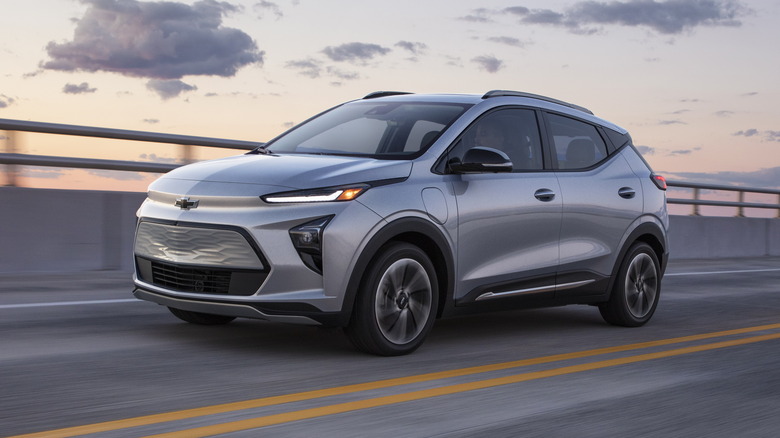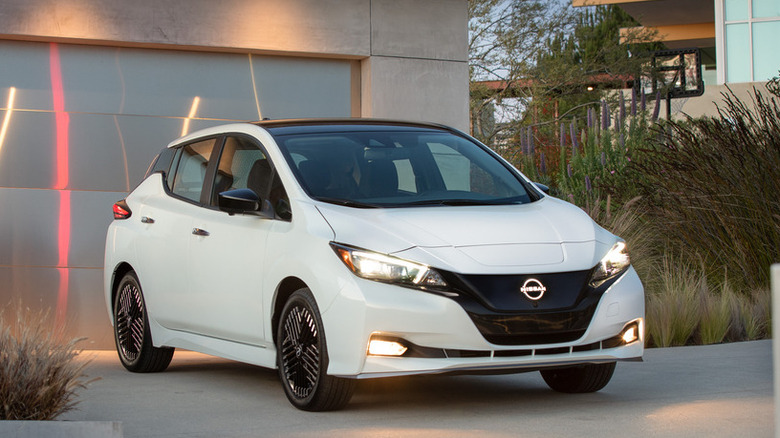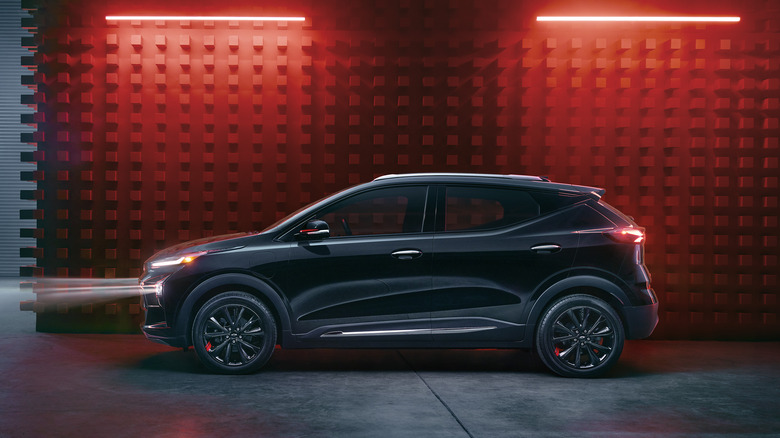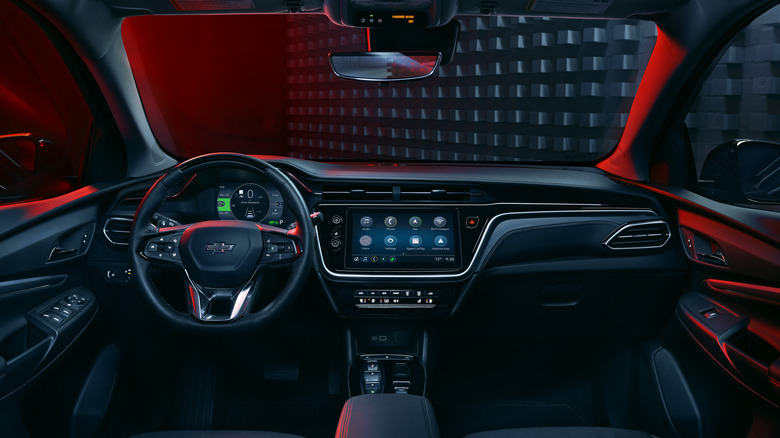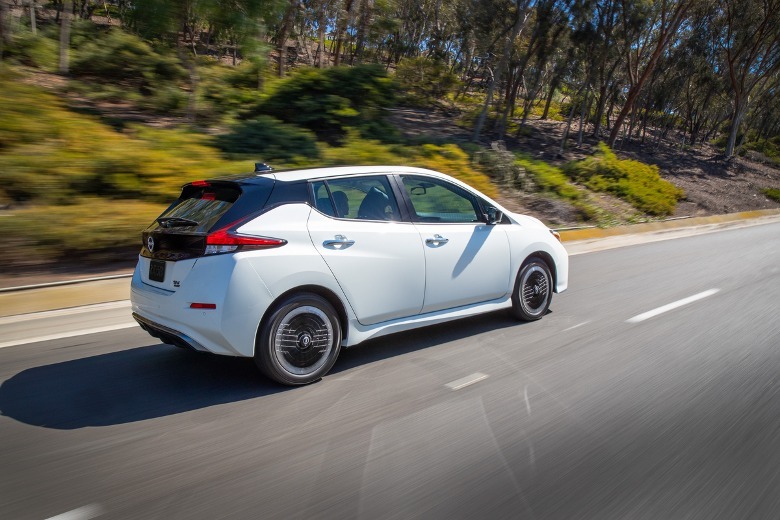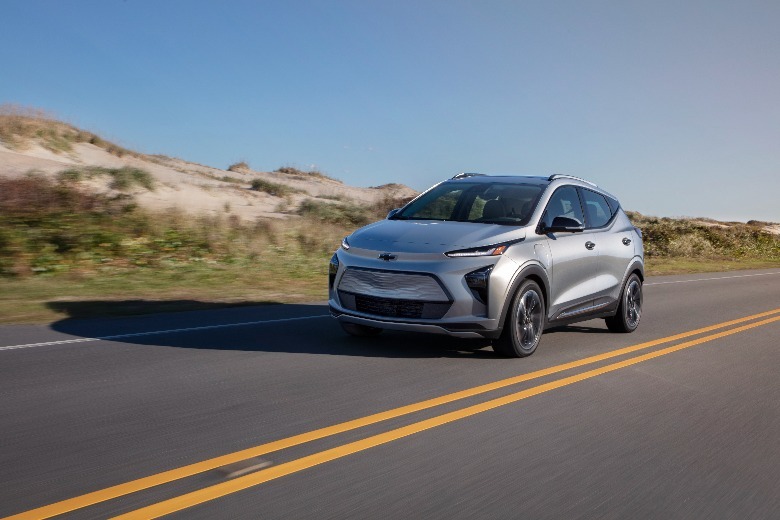Nissan Leaf Vs. Chevy Bolt EUV: Which EV Is The Better Buy?
The 2023 Nissan Leaf remains part of the second-gen variant that appeared in 2018. With base prices starting at $29,135, it remains one of the most affordable entry-level electric cars for the money. On the other hand, the 2023 Chevy Bolt EUV is a crossover variant of the popular Bolt EV, and made its maiden appearance on the U.S. market in 2022. Despite its growth spurt, the Bolt EUV offers terrific value for money with its $28,795 base price.
Here are two affordable EVs vying for the hearts and minds of buyers looking for their first electric car, but which is the better buy? Unfortunately, the Nissan Leaf and Chevy Bolt EUV won't blow your mind with their tepid performance, nor will they last the extra mile with their so-so driving range. But with base prices starting at below $30K, both EVs won't empty your bank account. Still, which offers the best value for the price?
Nissan Leaf: The granddaddy of modern EVs
The second-gen Nissan Leaf is a significant improvement over the first-gen model. For 2023, the Nissan Leaf receives a mild nip-and-tuck and an illuminated Nissan badge. The base Nissan Leaf S starts at $29,135 (before federal tax incentives), and is brimming with great tech features. It has an eight-inch infotainment touchscreen with Apple CarPlay and Android Auto connectivity, a four-speaker audio system, automatic headlights, automatic climate control, keyless entry, push-button start, and more.
The Nissan Leaf S has a 40 kWh battery and a single front-mounted electric motor with 147 horsepower. Nissan claims up to 149 miles of range, which is relatively low compared to more expensive machinery like Tesla and Hyundai EVs. However, the range-topping Leaf SV Plus has a more potent 214-horsepower electric motor, a larger 62 kWh battery, and 215 miles of range, which is not bad for its $37,135 base price. The Leaf SV also gets larger alloys, LED headlights, a heat pump, a leather tiller, and a power driver's seat.
All Nissan Leaf vehicles have a standard 240V Level 2 portable charger, and an old-school CHAdeMO DC charging port that supports up to 100 kW.
Chevy Bolt EUV: Good-looking newcomer
Chevrolet recently introduced aggressive price cuts across its EV range — including the 2023 Bolt EUV. The base LT trim starts at $28,795 (before tax incentives), about $6,300 less than before. It has a 200-horsepower front-mounted electric motor, and a 65 kWh battery that promises 247 miles of range on a single full charge.
In addition, the Bolt EUV LT comes loaded with 17-inch wheels, LED headlights, and heated mirrors. The interior includes ambient interior lighting, automatic climate control, 10.2-inch infotainment system with wireless Apple CarPlay and Android Auto, and a six-speaker audio system, among other features.
On the other hand, the Bolt EUV Premier shares the same powertrain and battery as the base LT trim. It starts at $33,295, but has more luxury features like cowhide upholstery, heated and ventilated front seats, rain-sensing wipers, and chrome exterior trim.
All Chevy Bolt EUVs have a dual-level charging cord that supports 120V Level-1 and 240V Level-2 recharging. However, the system only supports up to 55 kW of DC fast charging, a slight penalty in exchange for more driving range on a full charge.
Advanced safety features and practicality
The Nissan Leaf is a paragon of safety despite its relatively low base price. The advanced driver assistance features include automatic emergency braking, automatic rear braking, lane departure warning, lane keeping assist, blind-spot monitoring, and blind-spot intervention system. Moreover, the Leaf SV Plus gets a surround-view camera, adaptive cruise control, driver attention warning, and Nissan's ProPilot Assist semi-automated driving system.
On the other side of the fence, the Bolt EUV is not to be outdone by its standard Chevy Assist System. This advanced driving assistance package includes forward collision mitigation, lane departure mitigation, and automatic headlights. Furthermore, the top-of-the-line Bolt EUV Premier has parking sensors, blind-spot warning, adaptive cruise control, and rear cross-traffic warning. GM's Super Cruise hands-free driving system is also available in the Bolt EUV Premier trim.
According to Nissan, the Leaf seats up to five, while offering 23.6 cubic feet of cargo space behind the split-folding rear seats. If you fold the rear seats, you get up to 30 cubic feet of room to carry more oversized items.
Meanwhile, the Chevy Bolt EUV has a longer wheelbase than the regular Bolt EV, which translates to more rear legroom for its five-seat cabin. It offers 16.3 cubic feet of storage room with upright rear seats, but grows to 56.9 cubic feet when folded down.
Nissan Leaf vs. Chevy Bolt EUV: The verdict
It's hard to go wrong with the Nissan Leaf and Chevy Bolt EUV. Both EVs start below $30K and are brimming with advanced features and driving assistance technology. Moreover, buyers could pay less depending on local incentives after factoring in the available tax credits from the updated U.S. Inflation Reduction Act.
For the money, we'd choose the Chevy Bolt EUV for its mix of style, adequate performance, and higher driving range — not to mention it starts at a lower base price than the Nissan Leaf.
